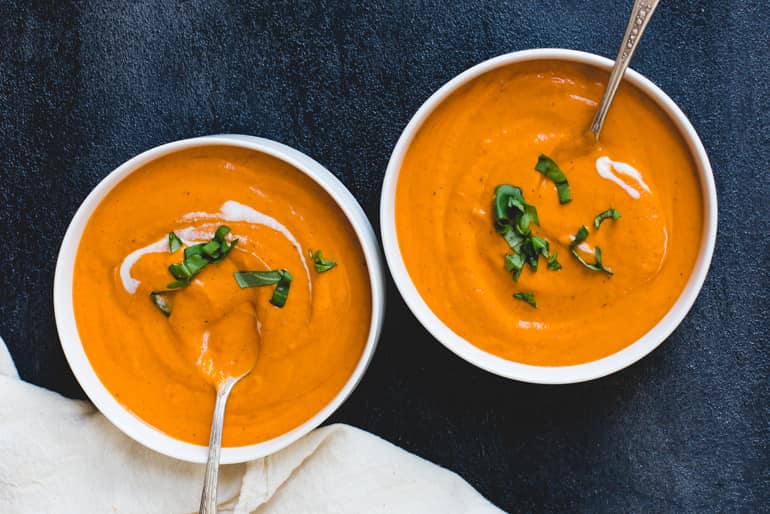9 Health Benefits of Tomato Soup
Packed to the brim with vitamins, minerals, antioxidants, and plant compounds, tomatoes are a superfood that offers a plethora of health benefits. Some studies have even suggested that eating tomatoes could protect against various diseases, including heart disease and cancer.
So, enjoying a delicious bowl of tomato soup isn’t just a treat to your tastebuds, but it is also a way to give your body and immunity a boost. You can enjoy some warm soup when the days get cold or even a cold and refreshing gazpacho in the summer!
Here are 9 health benefits of tomato soup (and they’re all backed by science!)

-
Full of Nutrition
Solanum Lycopersicum, or as they are more commonly known, tomatoes, are relatively low in calories and rich in nutrients and beneficial plant compounds. Here’s the nutrition profile of a large (182g) tomato:
Calories: 33
Carbs: 7 grams
Fiber: 2 grams
Protein: 1.6 grams
Fat: 0.4 grams
Vitamin C: 28% of the Daily Value (DV)
Vitamin K: 12% of the DV
Vitamin A: 8% of the DV
Potassium: 9% of the DV
Tomatoes are a great source of carotenoids – particularly one kind called lycopene, which is the pigment that gives tomatoes their characteristic bright red color. But color isn’t all we get from lycopene, especially given its potential preventative effect of several chronic illnesses. Eating tomatoes can provide up to 80% of the DV for lycopene.
Fortunately, and perhaps a bit surprisingly, research suggests that the human body is able to absorb the lycopene better when it has been cooked. This may be because the heat could increase the bioavailability or absorption rate of lycopene. This is also good news because tomato soup is made with cooked tomatoes!
-
Rich in Antioxidants
Antioxidants are an essential compound that a human body needs. They help neutralize the harmful effects of oxidative stress that occur when cell-damaging molecules, called free radicals, attack the immune system.
You can get a healthy dose of various types of antioxidants, including lycopene, flavonoids, and vitamins C and E, among so many others, from eating tomato soup. Getting a steady helping of antioxidants from your daily diet has been linked with lowering the risk of cancer and inflammation-related diseases such as obesity and cardiovascular illnesses.
Research has also found that the antioxidant properties of Vitamin C and flavonoids could help prevent the onset of type 2 diabetes, heart disease, and brain disease. Vitamin E acts as a boost to increase the antioxidant effects of Vitamin C.
-
Cancer-Fighting Properties
Tomatoes have been studied thoroughly in relation to their cancer-fighting properties, especially as they have a high lycopene content. They have been found to be most effective in fighting prostate and breast cancer. Breast cancer is the most common type of cancer found around the world (tied in first place with lung cancer), and prostate cancer is the fifth leading cause of cancer-related deaths globally. It is the second most diagnosed cancer among men.
Tomatoes are also rich in carotenoids, especially those such as alpha carotenoid, beta carotenoid, and lycopene. A high intake of carotenoids has been associated with a reduction in the risk of breast cancer up to 28%.
Several studies have found direct links between high lycopene intake, especially from cooked tomatoes, to a reduced risk of prostate cancer. Researchers postulate that lycopene may induce cancer cell death or slow the growth rate of tumors, a process called anti-angiogenesis.
However, a word of caution. While these studies are promising, evidence suggests that the potency of lycopene isn’t enough to be used as an anticancer drug by itself. In fact, some research suggests that lycopene’s antioxidant capacity may even interfere with chemotherapy and radiation therapy.
-
Promotes Healthy Skin and Vision
A warm bowl of tomato soup is a treat to your tastebuds, eyes, and skin too!
Beta carotene and lycopene are said to protect your skin against sunburn by absorbing ultraviolet (UV) light to increase the skin’s defense against UV-induced damage. A study was conducted with 149 healthy adults. They were given supplements containing 15 mg of lycopene, 0.8 mg of beta carotene, and several additional antioxidants. As a result, it was found that the supplement significantly improved the participant’s skin protection against UV damage.
However, researchers say that just increasing your lycopene consumption doesn’t mean you should alter your regular run protection skincare routine.
As for your eyes, eating foods rich in carotenoids and vitamin A, such as tomatoes, are a great way to reduce the risk of age-related macular degeneration.
The antioxidant properties of tomatoes are once again, where the benefits come from. They help reduce oxidative stress in the macula, which is a key part of the eye. Additionally, the body converts beta carotene into retinol, an essential compound for vision.
-
Improves Bone Health
Research indicates that lycopene is a major influencer in the regulation of bone metabolism. It increases the mineral density of the bones, in turn, reducing the risk of fracture and warding off bone-related illnesses like osteoporosis, a chronic disease characterized by increased bone fragility and fracture.
Osteoporosis disproportionately affects women and is considered one of the most important complications of post-menopause.
Bone metabolism includes the balance between cells called osteoblasts and osteoclasts. Osteoblasts are responsible for building bone, while osteoclasts take up the task of bone breakdown and resorption. Studies conducted on animals have found that lycopene influences bone metabolism by stimulating osteoblast activity to build bones while slowing down osteoclast activity of bone breakdown.
-
Reduced Risk of Heart Disease
Eating more tomatoes – or other foods rich in lycopene and vitamin C – may help reduce your risk of heart disease by reducing the levels of total and LDL (bad) cholesterol, which is a major risk factor. Lycopene and vitamin C help prevent the oxidization of LDL cholesterol, which is another risk factor for atherosclerosis.
Furthermore, lycopene helps reduce cholesterol absorption in the intestines and improves the functioning of HDL (good) cholesterol in the body. Carotenoids, which are present in abundance in tomatoes, also help lower high blood pressure, yet another risk factor for heart disease.

-
May Enhance Male Fertility
Oxidative stress is a major reason for male infertility and can lead to lower sperm viability and motility. According to some research, taking lycopene supplements can be a good treatment for reduced fertility because it’s antioxidant properties could increase the chances the producing a higher count of healthy sperm.
A study conducted on 44 men with infertility issues found that consuming commercial tomato products such as tomato juice or soup significantly increased blood lycopene levels, which improved their sperm motility.
Another animal study concluded that lycopene could reduce damage due to radiation therapy, which is often characterized by a lowered sperm count.
-
Boosts Immunity
In some cultures, tomato soup is administered as a home remedy for the common cold. Along with helping get more fluids into the system, tomato soup has a high content of vitamin C and carotenoids, which stimulate the immune system. Numerous studies have also found that vitamin C could be a way to prevent the common cold or reduce the duration and severity of its symptoms.
-
Easy to Make
Tomato soup is pretty easy to make. You can find hundreds of recipes online with different variations but here’s a simple recipe that you can make at home:
Tomato Basil Soup
Ingredients:
- 3 cups (735 grams) diced tomatoes
- 1/2 cup (80 grams) chopped onions
- 1 cup (250 mL) chicken or vegetable broth
- 4 cloves (12 grams) finely chopped garlic
- 2 tbsp. (30 mL) extra virgin olive oil
- 1/2 tsp. (2.5 grams) dried oregano
- pinch of crushed red pepper
- salt and freshly ground black pepper to taste
- 1 cup (24 grams) roughly chopped basil leaves
Directions:
- Heat a large saucepan over medium heat. Add the olive oil and onions and cook for 5 minutes until soft and tender. Add the garlic and cook for 2 more minutes.
- Add the rest of the ingredients except for the basil leaves. Stir well and season with salt and pepper.
- Lower the heat to medium-low and add the basil leaves, setting aside a few for garnish. Cover the soup and cook for 20 minutes.
- Remove the soup from heat and purée using a handheld blender or a conventional blender.
- Serve hot and garnish with extra basil leaves.
Purported Benefits of Tomato Soup NOT backed by science.
There are several other claims made by people as to what could be the benefits of tomato soup, but there are not backed by science.
One of these is the promotion of hair growth. A single large raw tomato (182 grams) has only 1.6 grams of protein – which is not much or enough to promote hair growth.
Another claim that people make is that tomato soup can help you lose weight by eliminating fat. While tomato soup is lower in calories and can be a great addition to your weight loss diet, it in itself does not eliminate fat. However, eating any kind of soup is a great way to lower your daily calorie and fat intake!
Disadvantages of Tomato Soup
Just like any other food on the face of this planet, there are a few downsides to eating tomato soup as well, especially if you are prone to the things listed below.

-
Trigger for GERD
Tomatoes are generally safe to consume, but they do have a high acid content, which makes them not the best thing to eat if you have GERD or Gastroesophageal Reflux Disease.
GERD is one of the most common conditions faced by people in the United States. A study conducted on 100 people with GERD concluded that tomatoes were a triggering food in about half the participants. Symptoms range from heartburn to chest pain and difficulty swallowing.
Treatment to GERD typically involves identifying and eliminating trigger foods from your diet, which means tomato soup is not the most ideal thing to eat if you have GERD.
-
High in Salt
All canned soups – including tomato soup – are typically high in salt. For instance, one can of tomato soup can contain up to 50% of the daily recommended intake for salt! Overconsumption of salt can cause high blood pressure in adults and children. Having one can of soup a day could easily push your salt consumption over to the excess limit.
Tomato soup can also contain lots of cream, which is high in fat and calories. This could be a bummer if you are looking to lose weight. The best way to enjoy tomato soup is to make it yourself. That way, you can control what goes into it and balance the amount of salt, fat, and calories.
The Bottom Line
Regular consumption of tomato soup provides you with several health benefits from the reduced risk of cancer and heart disease to increased fertility in men. It also helps improve the health of your skin, bones, heart, and more. The benefits to these are derived from the many plant compounds in tomatoes, including lycopene, beta carotenoids, vitamin C, and more.
There are also other claims such as the promotion of hair growth and elimination of fat that aren’t backed by science, so eating more tomato soup could do no good for you there.
On the other hand, you should avoid tomato soup if you have GERD. It is also best to make homemade tomato soup so you can enjoy all the benefits and nutrition of a delicious tomato soup without the downsides of high salt and fat you probably cannot avoid in the store-bought version.
